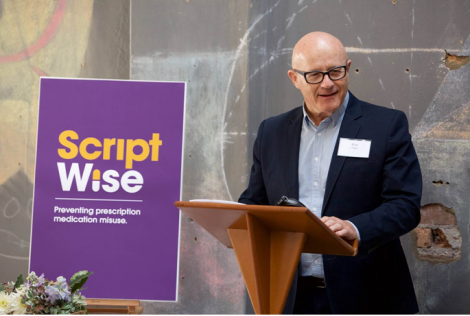A coordinated approach key to improving prescription medication misuse & deaths from overdose – September 29, 2015
Written by Kim Ledger and ScriptWise
 There are multiple drivers behind the escalating problem of prescription medication misuse and overdose deaths in Australia. The lack of consumer awareness and health information technology are overarching reasons for why prescription medication overdose deaths have outnumbered road fatalities.
There are multiple drivers behind the escalating problem of prescription medication misuse and overdose deaths in Australia. The lack of consumer awareness and health information technology are overarching reasons for why prescription medication overdose deaths have outnumbered road fatalities.
ScriptWise is a not for profit (NFP) organisation raising awareness of the potential harms and risks of prescription medication misuse. The organisation believes that in preventing further overdose deaths from prescription medications, there must be better coordinated efforts to improve patient education programs and real-time prescription monitoring.
Reports reveal 2.1 million Australians aged 14 and above use prescription medication for non-medical purposes.[1] In particular, Australians are the second highest users of prescribed opioids – powerful medications commonly used to treat chronic pain – worldwide. As a result, State Coroners nation-wide have been calling for the implementation of real-time prescription monitoring.
Initially, hopes in this regard were vested in the development of the Commonwealth system, otherwise referred to as the Electronic Recording and Reporting of Controlled Drugs (ERRCD) initiative. After two years of limited, and at times, contradictory information on the progress of this initiative to be rolled out nation-wide, the implementation of ERRCD has faltered.
Among the findings from the death of Glen David Kingsun, Victorian Coroner, Jacinta Heffey, stated “the ERRCD never promised the introduction of prescription monitoring system with universal coverage and was only ever intended to target those pharmaceutical drugs most vulnerable to misuse [Schedule 8 drugs].”[2]
“The delivery of a real-time prescription monitoring system is not particularly challenging from a technical perspective, as existing applications perform functions analogous to those required for a working real time prescription monitoring system,” argued Coroner Heffey.
Mr Kim Ledger, father of the late Australian actor, Heath Ledger and official Patron of ScriptWise, is urging both State and Federal Governments to acknowledge that prescription medication misuse and overdose is a national crisis, and it is time to adopt a multi-faceted approach to prevent further overdose deaths associated with prescription medications.
Mr Ledger said, “ScriptWise was born from the energy of many Australian families who have lost a child or relative to the misuse of prescription medication, and a year on, in driving this cause forward, we need the immediate support of prescribing doctors to demand for real time prescription monitoring.
“I am aware that there are many health professionals who witness the devastating impact of prescription medication misuse and are committed to reducing its harmful consequences. These health professionals are at the coal face and understand that the solution needs to happen at the point of care.”
Undeniably, when it comes to prescribing medicines of addiction, allowing prescribing doctors to have access to such tools is imperative.
“The families whom I have met in Victoria and Western Australia, who have been personally affected by prescription medication overdose, all strongly feel that a real-time prescription monitoring system would have prevented the death of a loved one,” said Mr Ledger.
CEO of ScriptWise, Ms Bee Mohamed explained that, “From ScriptWise’s perspective, we see great value in real-time prescription monitoring as part of the solution. This needs to happen at the point of care, within the doctor’s acceptable workflow practice, for which prescribing doctors are equipped with necessary tools to promote the quality use of medicines.
For more information about ScriptWise, head to www.scriptwise.org.au
- AIHW: Australia’s Health 2014. Available at: http://www.aihw.gov.au/WorkArea/DownloadAsset.aspx?id=60129548150 [last accessed August 2015].
- Finding into death without inquest. Coroners court of Victoria. Available at: http://www.coronerscourt.vic.gov.au/resources/bf07e772-0107-41de-807b-74e8d4bc177c/glendavidkingsun_255607.pdf [last accessed August 2015].

In a country and society where prescription drug use has become such a huge problem, deregulating the pharmacy industry and disregarding naturopathy as an alternative is on the cards. There seems to be a preoccupation in our culture of diagnosing, treating, and medication management yet, as noted above, “2.1 million Australians aged 14 and above use prescription medication for non-medical purposes” [1]. Where prescription use is a problem for both medically diagnosed problems and non-medical problems, it seems to be that an ideology of our prescribing and medication culture.
A few interesting events are noted here that seem less than ideal responses to the current medicalized environment. With the deregulation of pharmaceuticals, Ferrier Hodgson Health Team assert, “Chemist Warehouse stores may become as ubiquitous as the Seven Eleven chain and begin appearing on every other street corner”. Moreover, the RACPG has recommended that pharmacists and GP’s disregard homeopathic medication based on a lack of evidence. ‘Evidence-based medicine’ has been touted the ‘be all end all’ for the traditional medical community but that places limitations on benefits society might gain from qualitative evidence. Ideas such as arts-based medicine and holistic medicine have been gaining ground because the benefits, although qualitative in nature, are undeniable. I respect that the medical community needs a bar onto which they reference their treatment but disregarding alternatives that have ‘the wrong’ the of evidence seems flagrant in the current medication climate mentioned above.
Lastly, this article states that a coordinated approach for the misuse (and I argue, overuse) of prescription medication is necessary but the examples of the political and social environment I have mentioned, seem less important than ‘coordinating’ prescribing doctors.
Sites mentioned:
1. AIHW: Australia’s Health 2014. Available at: http://www.aihw.gov.au/WorkArea/DownloadAsset.aspx?id=60129548150 [accessed September 2015].
2. Ferrier Hodgson, Health Postcard: The Pharmaceutical Sector Prepares for Tougher Years Ahead, 2014 Available at: http://www.ferrierhodgson.com/~/media/Ferrier/Files/Documents/Publications/Health/The%20pharmaceutical%20sector%20prepares%20for%20tougher%20years%20ahead.pdf [Accessed October 2015].